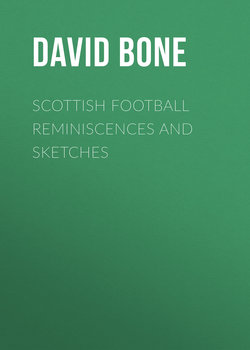Читать книгу Scottish Football Reminiscences and Sketches - Bone David Drummond - Страница 3
II. – THE FOOTBALL WAVE
ОглавлениеLike Dogberry's idea of certain kinds of novel writing, both Association and Rugby Football seem to come to the Scotchmen by nature. My readers can, perhaps, easily remember the clever jeu d'esprit on the antiquity of the Gaelic tongue which appeared several years ago advocating the claims of that race as lisping the first "speech" heard in Eden in a manner that must have stirred the blood of Professor Blackie. As the history of Association Football, with which I have only to deal under the present circumstances, is so well-known and a thing of yesterday, its origin, like that of the Gaelic language, is not shrouded in mystery, but actually known (or should be known) to all who take an interest in the game. In my previous article, I tried to trace the origin of football in its rudest form as played by our forefathers, when goal-posts and bars, to say nothing of corner-flags, were unknown. Football now, however, has been reduced to something like a scientific game, and to the credit of England be it said, the Association Rules there first saw the light. Scotch players in the Western District soon emulated their Southern brethren, and from the Parent Club, which had a humble and unassuming origin on the recreation ground at Queen's Park, sprang hundreds of clubs, spreading over the length and breadth of the land with remarkable rapidity. The wave soon rolled all over Glasgow and suburbs, submerged the whole country, and eventually invaded the Heart of Midlothian itself, where the Rugby code had hitherto reigned supreme. The schoolboys who played cricket and rounders in the summertime came out on a wintry afternoon to see their seniors engaged in Association football, and soon felt the desire creep over them to be members of a club containing lads like themselves. The young men engaged in the city all day thought on the health-imparting exercise it afforded, and had the necessary funds raised to form a club. The artisans, too, from the dusky foundry, the engineer shop, and the factory, soon began to dribble about. The young ones, and even the seniors themselves, had many a collision with mother earth ere they could rely on keeping their pins with any degree of accuracy, and it was rare fun to see a bearded man turning a somersault as he missed the ball in trying to make a big kick. Football is easily acquired in so far as the rudimentary part is concerned, but a great deal of probation is required to convert one into a crack player. Among those who now practice football, and their name is legion, the superior players can be numbered in (to give it a wide scope) hundreds. In fact, to be able to master all the details requisite to win a first-class match, one has to be capable of dribbling, middling, heading, and passing in a way that would do credit to solving a complicated problem in Euclid. It is all very well to talk about brute force and lasting power, but unless these are accompanied by scientific application, they are worth little, and cost much. "The race is not always to the swift," says the old proverb. In at least eight cases out of ten, the match is to the scientific and careful, but of this more anon. There is one thing that can be said about football which in the nature of things must recommend it to all lovers of out-door exercise. Of late years bicycling has obtained a great deal of popularity all over the three kingdoms, both for its usefulness as a speedy means of conveyance, and exercise to the limbs, but that it has its drawbacks has just been made apparent by undisputed medical authority. "The bicycle back," the effect of hard work on the "iron horse," is beginning to appear on the handsome young man who thinks nothing of doing his 50 miles a day, and while walking occasionally with the young lady with the "Grecian bend," the contrast in his case is amusing. To say that there are no dangers of any kind attached to football would be making an assertion which I cannot substantiate, but these are comparatively few. All sports, of whatever kind, have the elements of danger attached to their pursuit, but, with great care, these can be reduced to a minimum. Although I have certainly never observed the round-shoulders of the bicyclist in the football player, I have not unfrequently seen the "football leg." That is a series of cuts about the shin bone, administered by a vicious opponent while (as it generally happens) playing a "cup tie," and last season they were more plentiful than ever. In fact, I heard from the lips of a member of one of the crack clubs that in not a few of the ties they retired from the field "greatly impressed with the unmistakable signs of muscular ability shown by their opponents." This means most undoubtedly hacking and tripping, under the guise of tackling, and if Association football is to go on and prosper such disgraceful acts of tyranny on the football field must forever cease. These "accidents" can, of course, be avoided, and as there are distinct rules forbidding them, clubs would do well to see that these are rigidly enforced.
